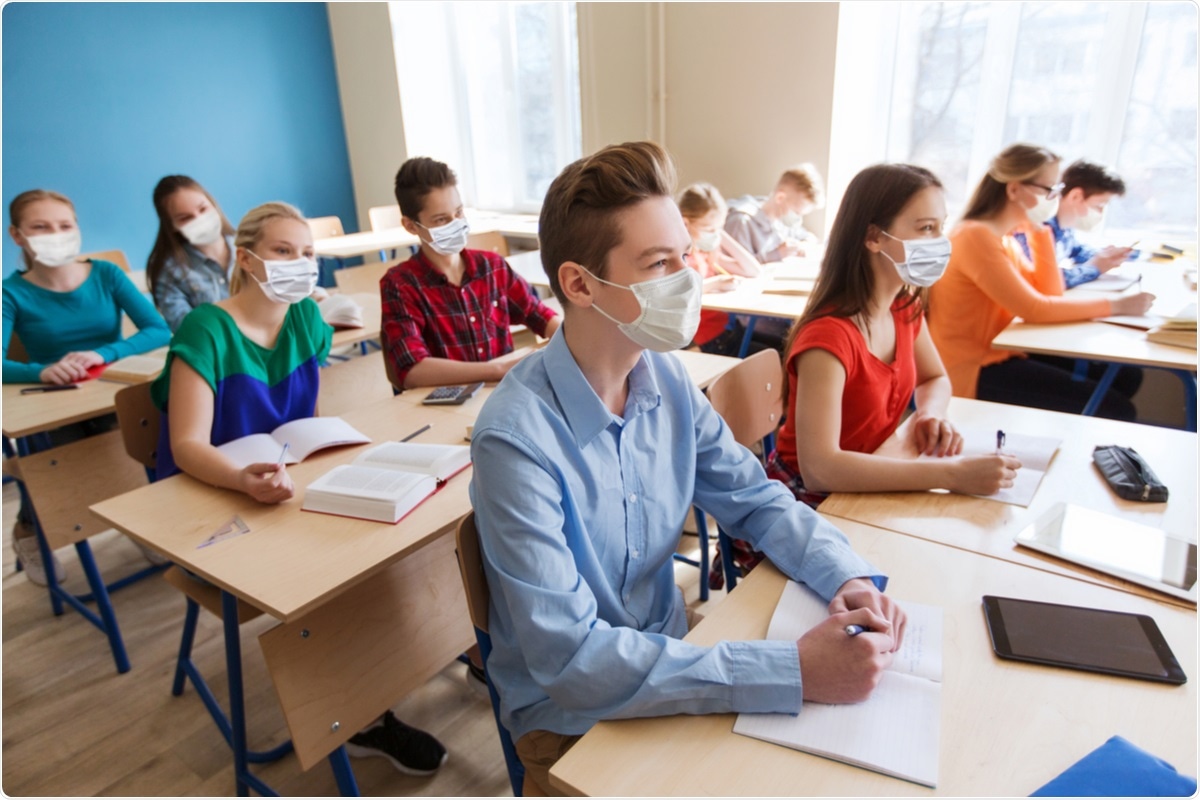A school-based survey conducted by scientists of the University of Zurich has revealed that about 60% of primary and secondary school students in Zurich, Switzerland, perceive mask-wearing at school as a useful intervention for controlling severe acute respiratory syndrome coronavirus 2 (SARS-CoV-2) transmission. However, some students have reported discomfort and side effects. The detailed report on survey findings is currently available on the medRxiv* preprint server, while the article undergoes peer review.
 Study: Perceptions towards mask use in school children during the SARS-CoV-2 pandemic: the Ciao Corona Study. Image Credit: Syda Productions/ Shutterstock
Study: Perceptions towards mask use in school children during the SARS-CoV-2 pandemic: the Ciao Corona Study. Image Credit: Syda Productions/ Shutterstock

 This news article was a review of a preliminary scientific report that had not undergone peer-review at the time of publication. Since its initial publication, the scientific report has now been peer reviewed and accepted for publication in a Scientific Journal. Links to the preliminary and peer-reviewed reports are available in the Sources section at the bottom of this article. View Sources
This news article was a review of a preliminary scientific report that had not undergone peer-review at the time of publication. Since its initial publication, the scientific report has now been peer reviewed and accepted for publication in a Scientific Journal. Links to the preliminary and peer-reviewed reports are available in the Sources section at the bottom of this article. View Sources
Background
Since the beginning of the coronavirus disease 2019 (COVID-19) pandemic, low susceptibility to severe disease has been observed among children compared to that among adults and the elderly. Although the rate of SARS-CoV-2 infection among children is mostly similar to that among adults, evidence claims that the risk of viral transmission from infected children is relatively low. In accordance with this observation, large outbreaks of COVID-19 have rarely been observed in schools that remained open intermittently or constantly during the pandemic.
In Switzerland, schools remained open throughout the pandemic except for the nationwide lockdown between March and May 2020. All schools were advised to implement appropriate control measures, including mask-wearing, physical distancing, and frequent hand washing. In Zurich, compulsory mask-wearing was introduced for secondary and primary school children in November 2020 and February 2021.
In the current survey, the scientists have explored school children's perceptions towards the utility of mask-wearing in school and public places.
Study design
The survey was conducted on schoolchildren aged 10 – 17 years enrolled for the Ciao Corona study, a prospective school-based cohort study exploring SARS-CoV-2 seropositivity among school children in the Canton of Zurich.
In the current online survey, two questionnaires were provided to the school children and their parents to gather information on children's perceptions towards mask-wearing behavior and its usefulness.
Important observations
More than 1,500 children responded to the online survey. About 60% of them perceived mask-wearing as a useful intervention at school and in public places. No significant difference in perception was observed between primary and secondary school children. However, a gender-wise variation in awareness was observed, with girls perceiving mask-wearing as useful more frequently than boys at school and in public places. A comparatively higher positive perception of mask wearing was observed among children whose parents have a higher educational background.
In each questionnaire, about 20% of surveyed children provided free-text comments on mask-wearing. Children who responded negatively on the usefulness of masks at school and in public were more likely to comment. The majority of the comments were on discomfort and side effects, such as headache, skin rashes, ear pain, and difficulty breathing. In addition, children commented on general rejection, frustration, and mistrust. Regarding situation-specific complaints, children mentioned difficulty breathing during physical activities.
The majority of children mentioned wearing a disposable mask or a combination of disposable and fabric masks. The majority reported storing masks in a pocket or fastened around the arm. Only a small fraction of children mentioned storing it in a plastic or fabric bag. Regarding wearing duration, middle-level and upper-level school children reported 6 hours and 7 hours daily, respectively.
Study significance
The survey findings indicate that a high percentage of school children in Zurich, Switzerland, accept mask-wearing as a useful and effective intervention to prevent SARS-CoV-2 transmission at school and in public places. The frequency of a positive perception of mask wearing is relatively higher among girls and children of parents with higher educational backgrounds.
As mentioned by the scientists, the discomforts and side-effects children face due to prolonged mask-wearing should be addressed by the school authorities to ensure a high willingness to wear a mask.

 This news article was a review of a preliminary scientific report that had not undergone peer-review at the time of publication. Since its initial publication, the scientific report has now been peer reviewed and accepted for publication in a Scientific Journal. Links to the preliminary and peer-reviewed reports are available in the Sources section at the bottom of this article. View Sources
This news article was a review of a preliminary scientific report that had not undergone peer-review at the time of publication. Since its initial publication, the scientific report has now been peer reviewed and accepted for publication in a Scientific Journal. Links to the preliminary and peer-reviewed reports are available in the Sources section at the bottom of this article. View Sources